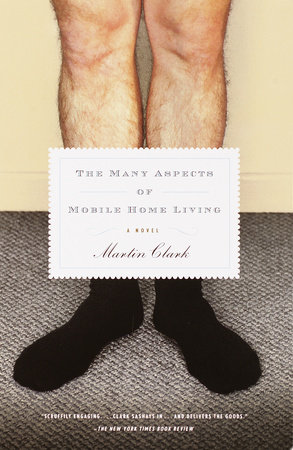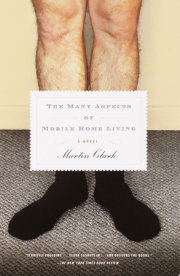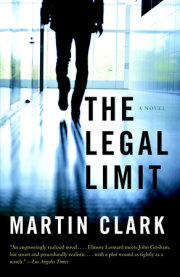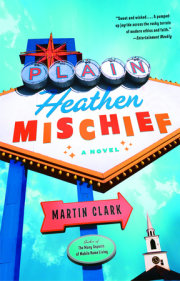Chapter One In 1969, when Evers Wheeling was a boy in Winston-Salem, North Carolina, men in filling-station uniforms still checked your car's oil, pumped high-test gas out of heavy silver nozzles and cleaned your windshield with a spray bottle and a blue, quilted wipe. There was a man named Herman Stovall who worked at the West End Shell, where Evers and his family would stop for fuel and air and little Cokes with peanuts poured into the bottle. Herman was a bent, thin, wispy man, a skeletal bumpkin with a crew cut and big red ears. He could hold an inch-long ash on his cigarette, and he didn't think that astronauts had touched down on the moon and he didn't believe in gorillas, even though they'd been on exhibit in various zoos for over half a century. Herman would give Sundrop caps out of the drink machine and tin Prince Albert cans to Evers and the other kids who visited the station, and he would lean over the greasy cash-register counter to show them cat's-cradle tricks with a loop of grimy brown twine. Evers would take the soda caps home in a paper sack and scratch off the cork on their undersides, trying to win a free pop or a five-dollar bill.
Herman also did not believe in viruses, whales, the Loch Ness monster or radar that could predict the weather; he warned Evers and everyone else who came onto his one-bay, nuts-and-bolts corner lot to be cautious of easy ruses, sleight of hand and men who wore vests with their suits. "I don't have no time for foolishness," Evers once heard Herman say to a woman with Texas plates while he was fitting a metal spout over a can of motor oil and telling her what he thought about rockets flying through space, traveling from planet to planet. The spout made a wet, slicing sound when it cut through the top of the can, and Herman used the noise to end his sentence.
Many years later, when Evers first got on the trail of the smiling white shrine, he had become a lot like Herman Stovall. Evers didn't believe in very much at the time, and he was socked in under a long horizon of bloodless indifference as thick as paste; he had the look and air of a cur mother suckling another gang of mongrel babies, her head and side lying flush on the ground, her fur clumped in a few spots, too weary to do much more than shift her eyes and half-ass growl if someone happened by. On the morning that Evers got his first glimpse of the albino mystery, he'd been walking into the sun, scraping down the sidewalk, burping up squalls of alcohol and two-in-the-morning microwave lasagna. He had just passed by a can of garbage spilled in an alley when he thought he heard someone say his name. Evers was dizzy, the sun was sharp and combative, and he was trying hard to get to his office, so he didn't stop moving right away.
"Judge Wheeling? Sir?"
Evers looked around for the voice, put up his hand to shade his eyes. "Huh?"
"Good morning."
Evers stopped and looked to his left. His balance wasn't all that good when he stood still.
"Would you come in here, please?" The woman speaking to Evers was a stranger -- beautiful, handsome, well dressed and tan -- and he had a muddled thought that perhaps she was talking to someone else, even though she had called him by name and was looking right at him, smiling. She was standing in front of a coffee shop not far from the courthouse where Evers worked.
"Me?" Evers looked over his shoulder, then down at his feet on the sidewalk. The woman was so pretty that he did not want to see her face for very long. He dropped and bobbed his head in choppy, pell-mell pecks, up and down and from side to side, like an old bird eating seed, and he put his hands in his pockets, took them out and put them back in again. A fat man with leather sandals and short pants walked past Evers and bumped him, brushed his back. "Are you talking to me?" Evers looked up for a moment and blinked and took his hands out of his pockets.
"Yes."
"Who in the world are you?" he asked.
"Would you come in here? I need to speak with you. Please?"
"What do you want? I don't think I know you. Is it about court, about a case?"
"No. But you are Judge Wheeling, aren't you? Judge Evers Wheeling?" The lady had taken a step and was standing right in front of Evers. "I'm Ruth Esther English. I go by Ruth Esther."
"Yes . . . nice to meet you." Evers turned and watched a tall man with a package walk past. He heard a car horn blow. "You really startled me or something -- not startled, I guess, just made me uneasy." Evers kicked the sidewalk with the toe of his shoe.
"I didn't mean to upset you. Sorry."
"That's all right. I don't know why I feel so odd. People stop me all the time and want to talk." Evers stepped back and looked at the woman. She had blond hair and her hands were clasped in front of her, her two index fingers pressed up into a point. She didn't move, didn't offer to shake hands, just pulled her hands closer to her chest.
"I would like to discuss somethin' important with you for a little while. I know that you're busy, but I'd be grateful. It won't take long."
Evers shuffled his feet on the sidewalk; he felt his soles catch on the cement. His head hurt. He looked out at the traffic driving by.
"Judge Wheeling?"
Evers didn't say anything. He noticed that Ruth Esther's pants were loose around her ankles, and that she wasn't wearing hose or socks.
"Sir?" Ruth Esther touched her lips with the tips of her fingers. "Would you let me talk to you?" She kept her fingers in front of her mouth and spoke through the spire.
It was May in Winston-Salem, already warm, and Evers was wearing a suit coat, tie, long sleeves and a T-shirt. "What do you want to talk about? I have to be in court in just a few minutes." Evers began to think he was still drunk from the night before. He saw the corner of a building start to wash out; the hard brick edge turned into a lazy, aimless blur.
"I would like to speak to you in private about a personal matter."
Ruth Esther was younger than he, probably twenty-four or twenty-five, Evers decided. He felt his heart beating in his head, and his back and chest were starting to sweat. When he tried to look at Ruth Esther, he could see only her face and a jumble of swirls and streaks. He squinted and strained, struggled to get things to quit fading. The people behind her were blots and noise, and the sidewalk next to the restaurant was full of currents and eddies and erratic hues, breaking around him like a dappled creek. Evers' hands started to shake, and he rubbed them together. He rolled his head, squeezed his eyes shut, then opened them and focused on the lady in front of him: she looked more like a painting than a person, boxed in by the doorway, full of grace and goodness, like a perfect Renaissance child, all eyes and face and cheeks. "I guess I could. For a moment. I need to clear my head. I don't feel right. It's like watercolors or . . ."
Ruth Esther held out her hand, but Evers didn't move, so she touched his arm and they walked into the restaurant. The White Spot Grill and Coffee Shop was about three minutes away from the Forsyth County Courthouse. Evers rarely ate at the "Spot" -- it was small and too crowded. He stepped inside the door, just ahead of Ruth Esther, into the smell of bacon and cigarette smoke and Ruth Esther's perfume, a sweet, quiet scent he'd never run across before.
"I'd like to talk somewhere private," Ruth Esther said.
"How about right here, ma'am?" Evers felt some of his balance returning. It was cooler in the restaurant than on the street, and the colors were darker and didn't seem as skittish.
"Do you think that it would be possible for us to step into one of the restrooms? I know that sounds strange, but I don't want other people listenin' to our conversation."
"Are you serious? Here? The toilet?" Evers' tongue was so dry that it didn't come off the roof of his mouth when he said the last word.
"Yes."
"Did I understand you . . . hear you right?"
"I think so."
"Are you a hooker or something? Is this some state police scam to test my integrity? You think that I'm going to walk into the toilet with a woman I don't know seven blocks away from the courthouse where I punish people for minuscule moral lapses and running red lights at three in the morning when nobody else is there? Are you -- "
"If you run a red light at three in the morning and no one sees it, does it make a sound?"
"You mean like an alarm or some sort of device. . . ." Evers stopped.
Ruth Esther unfolded her hands and laughed. It occurred to Evers that she had kept her fingers in front of her, still and steepled, almost the whole time they were talking. "And someone would have to see it for it to end up in court."
"Thank you, Descartes." Evers' mouth was a thin, ill line.
"I wasn't trying to be smart. You seem pretty uncomfortable, and I was just trying to make you laugh, break the ice, that sort of thing."
"It's a pretty somber morning for me, ma'am."
"Well, why don't you go in to the men's room first? I'll follow you in. That way, if things go wrong, it would be easier for you to explain. And I'll leave my purse here on the counter, in case that's somethin' you're worried about . . . you know, that I might shoot you or stab you or try to hurt you."
"Miss, I appreciate the intrigue and your good looks, I like your sense of drama, I like the way your suit fits and how you try to look me in the eye when we talk even though we're strangers. But I'm going to go to work, get a couple of Cokes from the vending machine, put on my polyester robe and spin the wheels of justice." Evers' legs felt heavy, and the crowd and smoke in the cramped grill were making him queasy.
Evers and Ruth Esther stood beside each other in the restaurant entrance and didn't say anything else. Evers wanted to leave, to get out, to finish this encounter as best he could, but three men and a woman in a sundress had pressed in behind him, all of them smoking and craning their necks to look for a booth. A waitress with a stack of dirty plates and glasses told Evers and Ruth Esther to sit wherever they wanted to; a fork fell off one of the plates when she turned her back and pushed open the door to the kitchen.
Evers was sick from drinking, and he had walked into this woman who wanted to talk to him in a bathroom, and she was probably crazy or working for the police or full of spit and ire because of some quirk or hiccup or imagined slight. "I'm sorry that I'm no more helpful. I'm not trying to be rude, but I need to get to work." He shrugged and turned his palms up.
"What I need to speak with you about is very important. I've approached you, and I'm asking you to go with me, not the other way around. I understand that you need to be careful about things. I understand. I'm not crazy or mean or trying to make any kind of sexual offer or -- what's the word -- entrap you, set you up. I just need a private moment."
"You can't talk to me on the phone or come by my office?"
"I'd rather not wait."
"Why?"
"There's a lot at stake. For me and for you. For both of us."
"For me?" Evers was still avoiding Ruth Esther's face. He saw that the fork had not been picked up.
"Please."
"This involves me?"
"Yes."
"And it's not connected to my work?"
"No," Ruth Esther answered.
"You're certain?" He took a brief look at Ruth Esther's eyes.
"Yes."
"Why not, then? Let's have a peek at the prize behind the curtain," Evers said, and he turned and started toward the rear of the grill. "I guess if you're a lunatic, at least the story will be fun to hear. If you're worried about people reading our thoughts through satellites or TV screens, you can stop them by wearing a tinfoil hat. If that's the problem, we don't have to go into the bathroom. Any kind of thought snatching, a tinfoil hat will stop it. I run into the problem two or three times a year, so I know the solution. Just Reynolds Wrap your head -- they can't get past the foil."
"I'll remember that. I'm sure the spies and aliens are hard at work on new tricks, though, ideas to get around the hats."
Evers opened the door to the restroom, and Ruth Esther walked in behind him. The room was clean and the walls mostly white, and drops of water had turned the sink bowl green around the drain opening. There was no stopper in the sink, and a bar of orange soap with brown, dry webs and bubbles was on top of the basin. The floor was dark, made from eight-sided tiles.
"I would be grateful to you if you would let Artis English go free when his case comes up in your court," Ruth Esther said as soon as she closed the door to the restroom.
Evers walked to the sink and saw his reflection in a small mirror with a cardboard frame. The mirror was hung on a short, black nail. He turned on the cold water. "Ma'am, if he's innocent, I will let him go. If he's guilty, I will find him guilty. That's the way it works." Evers was washing his hands and didn't look at Ruth Esther when he spoke. "And sometimes, guilty people are not punished because of constitutional problems or technical concerns."
"I don't know much about the facts in his case." Ruth Esther was leaning against the door.
Evers had finished his last drink about five hours earlier, and he felt the red wine in his stomach surge toward his throat. He imagined a cartoon thermometer, red mercury rising up the scale and exploding out the top. He stepped back from the sink and bent down, so his head was over the bowl. "It would seem that you lied to me. I thought that you didn't want to talk about a case or my work."
"You look sick, Judge Wheeling."
"Stomach flu."
"I'm sorry."
Ruth Esther sounded so earnest that Evers turned and looked at her over his shoulder. "Have we ever met before?"
"No."
"Do you know my wife? Are you a friend of hers?" He ran some water into his hands and splashed his face.
"No. I mean, your wife and I are not friends. We've never met or spoken. I just wanted to speak with you about Artis' case. It's important to me. Artis English. He's charged with cocaine possession."
"Are you a relative or something?"
"Sister. I'm his sister, although we don't look alike." Ruth Esther walked to the sink, and Evers straightened up.
"Well, it's good of you to be so supportive. I'll be fair to your brother."
"I know you will. You have that reputation. He may need more than that, though."
Evers turned toward Ruth Esther. She was solidly in front of him now; the spinning and whirling had stopped. Everything stayed inside its outline. Ruth Esther's top and pants were white, and she wasn't wearing any jewelry. He heard the water dripping in the sink, and silverware dragging across a plate out in the restaurant. "Then he is going to be shit out of luck, Miss English."
"Oh . . . "
"What else can I say?" Evers closed his eyes a little longer than he usually would, like heavy blinds lowered and lifted, and then he raised his eyebrows.
Ruth Esther's expression changed; her face crumbled, filled up with creases and puckers, and her features came undone, fell apart. She put the point of her chapel fingers under her chin, bowed her head, and then she turned and hurried into the commode stall, almost ran. The heels on her shoes beat and slid on the floor, made spastic taps that came and quit and rolled along like frantic jig steps. She banged the stall door shut, but the lock's clasp bounced against the frame, and the door swung open about a foot or so. From where he was standing, though, Evers couldn't see very far into the stall. He saw Ruth Esther's hand and some of her sleeve flash forward, heard her shove and rattle the small deadbolt into the metal loop that kept the door in place. He looked up at the ceiling, thought about cameras and peepholes, and reached toward the door to the restaurant even though he was still near the sink, too far away to get to the knob. "What are you doing?" he asked. "What's going on?"
Ruth Esther didn't answer. Evers heard the last part of a sob, sniffling and some muffled, blunt gulps. It sounded like she was trying not to cry.
There was a gap between the bottom of the stall door and the floor -- the opening private eyes and psychopaths always check to see if someone's hiding in the john -- and Evers could see that Ruth Esther's pants were bunched around her ankles, and that her underwear was pulled across above the pants, stretched tight, connecting leg to leg. The front partitions of the stall were bolted to the floor with silver brackets; the brackets and screws were nicked and pitted and spotted with rust, and a thick piece of cotton mop string was caught underneath the edge of one of the brackets. "What are you doing?" Evers asked again. "Are you okay? Are you crying?"
"I'm sorry. I'm okay. I'm comin' right out. Don't leave. I'll be right there. I'm embarrassed . . . I'm just upset some. Nervous."
"I can't be late for work. What else do you want, anyway?" Evers frowned. "This is a crazy confrontation. So far, I know you want me to let your brother go. I've told you that I'll follow the law and be fair. If two fat-ass police officers are out there eating McMuffins and thinking about bowling uniforms while they're recording this, I'm telling them the same thing. I'm sorry. If you're offering me sex, then I am declining. I don't want money, either. There's nothing that you can do or say that's going to change my sentiments. I didn't mean to upset you, but I can't help."
"Please don't leave yet."
Evers waited another minute or so, didn't say anything more to Ruth Esther. He heard someone shout for a waitress out in the restaurant, and a man's voice ask for more coffee. "Ma'am, I really am going to go," Evers said. "I have to. You're okay, aren't you?"
Ruth Esther opened the stall door and bumped it toward Evers with her shoulder. She was disheveled when Evers saw her, not all the way dressed, stuffing the tail of her blouse into the top of her pants, and after a couple of jabs and tucks, she gave up and left several uneven folds hanging out of her waistband. She put her hand inside her pocket, and Evers' mouth opened and he took in his breath -- a hard suck that the tiles trapped and echoed, the sound circling the room two or three times. He stepped away from Ruth Esther until he felt the edge of the sink hit him in the back. "This is my business card," she said before she took her hand out of her pocket. "I'm going to leave it on the windowsill for you. Please give some thought to freeing my brother. He has information I need to help me locate property that belongs to me. I can't get my property unless he's out of jail."
"That's all very interesting, but I cannot and will not help you. I'll decide your brother's case on its merits."
Ruth Esther nodded. "I'll leave my card. Please just keep an open mind." She worked on her shirt a little more, pushed it into her pants, and she touched the corner of her eye where some makeup had dried into a tiny, blue-black ball. "Just think about it."
After Ruth Esther left, Evers leaned against the restroom wall and patted his pockets, looking for his cigarettes. Ruth Esther had walked right past him on her way out, and was face to face with him when she opened the door to go back into the restaurant. Evers locked the door. He lit a cigarette and smoked part of it while he was resting on the wall; after a few minutes, he slid and slumped down until he felt the floor underneath him, and he sat there looking at his knees and at his hand holding the cigarette. He finished the cigarette, put it out in the sink and walked across the room to pick up Ruth Esther's card.
When Evers walked by the stall, he glanced inside, and he saw -- he stuck right where he was, didn't go any farther, reeled and spun and herky-jerked to get a better look -- there was a perfect white curve lying on the floor in front of the toilet, five flat alabaster drops, this albino arc that looked like a row of marble dimes laid down into a big grin, small bright circles, a vivid Morse code smile: dot dot dot dot dot. The circles were all the same size, and Evers stepped closer and crouched down. Light from outside was coming into the bathroom through a window, and occasionally a moment's worth of brightness would reflect off the water in the commode and settle on his jacket or the crease in his pants. Evers stood above the smiling drops until he heard someone out in the restaurant knocking on the door. He rubbed the white circles with the toe of his shoe until they disappeared, picked up the card from the sill and put it into his pocket without reading it.
. All rights reserved. No part of this excerpt may be reproduced or reprinted without permission in writing from the publisher.

































































































